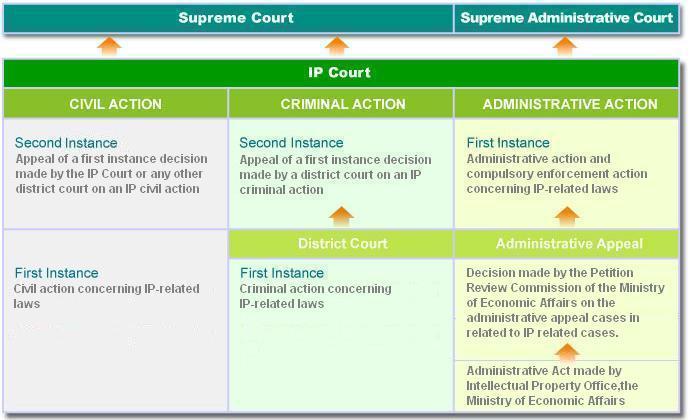|   
IP Case Procedures: Taiwan IP Court

IP-related cases are mainly heard in accordance with the Intellectual Property Case Adjudication Act, effective from July 1, 2008 and having 39 articles. The characteristics of the Act are as follows:
The validity judgment in IP infringement cases
In IP-related civil or criminal procedures, the court shall rule independently on validity issues, without postponing the action to await the related administrative decision on IP validity.
The role of Taiwan IP Office in civil action
When the civil action has to decide on the validity of the intellectual property right, the Act provides that the court may order the Taiwan Intellectual Property Office to intervene in the trial.
Non-disclosure procedure in cases with trade secrets
Private proceedings shall be conducted for all IP trials involving trade secrets. Restrictions will be placed on reviews, transcription, and videotaping of court documents.
The Introduction of the confidentiality preservation order
In IP-related action, the party who is required to preserve confidentiality is often the counterpart in the action and a competitor in the marketplace as well. In spite of prohibition or limitation of the review or the discovery of the relevant case materials may be necessary, the right of the counterpart shall also be taken into consideration. The materials containing trade secrets of either party or a third party shall not be allowed to obstruct or hinder counterpart right in claiming evidence. To balance the interests of all parties, the Act, following Japanese law, stipulates that the court dealing with IP-related cases may grant an order to preserve confidentiality, and may impose penalties upon anyone who acts in a manner contrary to the order.
The obligation to present necessary documentation or evidence
In an IP-related civil or administrative case, anyone who holds relative documents or evidence is obligated to submit them for inspection. Anyone who refuses this obligation may be subject to fine. The submission of the objects at issue may be enforced when necessary.
The coercive enforcement of preservation of evidence
When the counter party refuses the enforcement of the preservation of evidence order without a legitimate ground, the court may enforce such order if it is required. The court may request assistance from the police for enforcement if necessary.
The obligation to demonstrate the grounds for injunction
Products involving in IP-related disputes are characterized by their short life cycle in the market. An injunction which is granted to prohibit manufacture or sale may cause serious consequences. The product under the injunction may be phased out and the company may be expelled from the marketplace before a final decision on the case is rendered. Thus, the court shall proceed with caution when dealing with the motion for an injunction. In a civil or administrative action, the Act requires the applicant to demonstrate the grounds for the injunction in his/her preliminary showing, and the court shall dismiss the motion if the grounds are not sufficiently elaborate.
A supplementary civil action may be tried in a criminal action in the interim
A supplementary civil action concerning IP infringement shall be ruled independently at the same time as the criminal action is decided. The court, if necessary, may render its decision on a supplementary civil action in a summary procedure within 60 days after the criminal action is decided.
|

